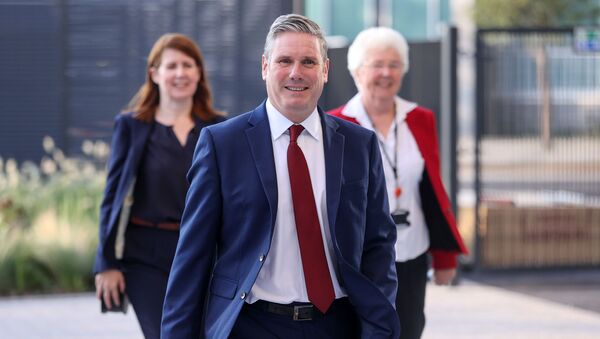Although Sir Keir Starmer has been seen to shift away significantly from the hard left-wing stance which so characterised his predecessor Jeremy Corbyn, the Labour Party leader has vowed to keep to his campaign pledge to raise taxes on Britain's top earners.
Speaking to the Huffington Post on Friday, Starmer said that his priorities may have to “be bolder than we imagined” to meet the new challenges facing the economy amid the ongoing coronavirus pandemic.
Referring to remarks made by Shadow Foreign Secretary Lisa Nandy last week, the Labour leader was asked to confirm if he had abandoned his pledge to increase the rate of tax for those earning more than £80,000.
“No, they were important pledges – very important pledges – in terms of the approach I would take and the priorities I would have as leader of the Labour party, and they remain my priorities", he said.
Citing the scale of change in the "conversation" over issues since last year's general election, Starmer did not commit himself to specific tax hikes found in the December manifesto which including creating a 45p tax rate for earners making more than £80,000 and 50p for those receiving more than £150,000.
“What I’m saying is, the work and the challenge now is so much more profound than we thought it was in 2019. Or even this year before the pandemic hit. It actually means we might have to be bolder than we might have imagined.
“The next general election is in 2024, so I don’t think it’s prudent at this stage to set out tax arrangements for 2024, when we don’t know the size of the debt, we don’t know the damage that has been done", he added.
Starmer also said that because of the present COVD-19 situation and the amount of time before the next election, the "strategic priorities" for the next Labour government had not yet been outlined.
The Labour leader said that the party will have to "confront a completely different world, where the economy is going to take a massive hit" which exposes the "fragility of our public services".
“One of the reasons I think that we have fared so badly in the UK is because of the effect of austerity and the fragility of our economy. We’ve got to face up to that. We’ve got to rebuild in a better way".
In his campaign for the position as Labour leader, Starmer pitched to the left amid concerns that he would take the party in a rightward direction with 10 pledges to Labour members. One of which was “to increase income tax for the top 5% of earners, reverse the Tories’ cuts in corporation tax and clamp down on tax avoidance, particularly of large corporations”.
Thread: It has taken just 6 months for @Keir_Starmer to break his pledges on:
— Mike 🏴🚩 (@mfinnthepoet) September 23, 2020
1) economic justice
3) climate justice
4) promote peace and human rights
5) common ownership
6) defend migrants rights
8) radical devolution
9) equality
10) effective opposition to the Tories pic.twitter.com/LxJlilLCvg
As the coronavirus crisis has developed, however, Labour has refused to call for tax rises, claiming that they would inhibit economic recovery and average incomes as the UK's economy faces a steep recession.
Starmer has been criticised by the left-wing of his party for seeming to drift from much of Corbyn's policy positions - not just for the leadership's economic proposals but also his abstaining from a vote in parliament last week to exempt British servicemen from being prosecuted for war crimes.
"In the face of mass unemployment and the evaporation of economic demand, Labour has dismissed the idea of universal basic income and chosen to support landlords over private renters", said left-wing writer David Wearing in an article in May.
"These are clear signs of a leadership focused squarely on protecting its right flank by not rocking the boat, rather than on maintaining support to its left by acting as a genuinely progressive opposition", he added.
Labour under Starmer also echoed the Government's demands to reopen schools, despite warnings from party colleagues that it would contribute to a second outbreak of coronavirus cases.
Despite the Labour Party's election defeat under former leader Corbyn, a YouGov survey published in May showed that t 61% of the UK public would support a wealth tax for those with assets of more than £750,000.


